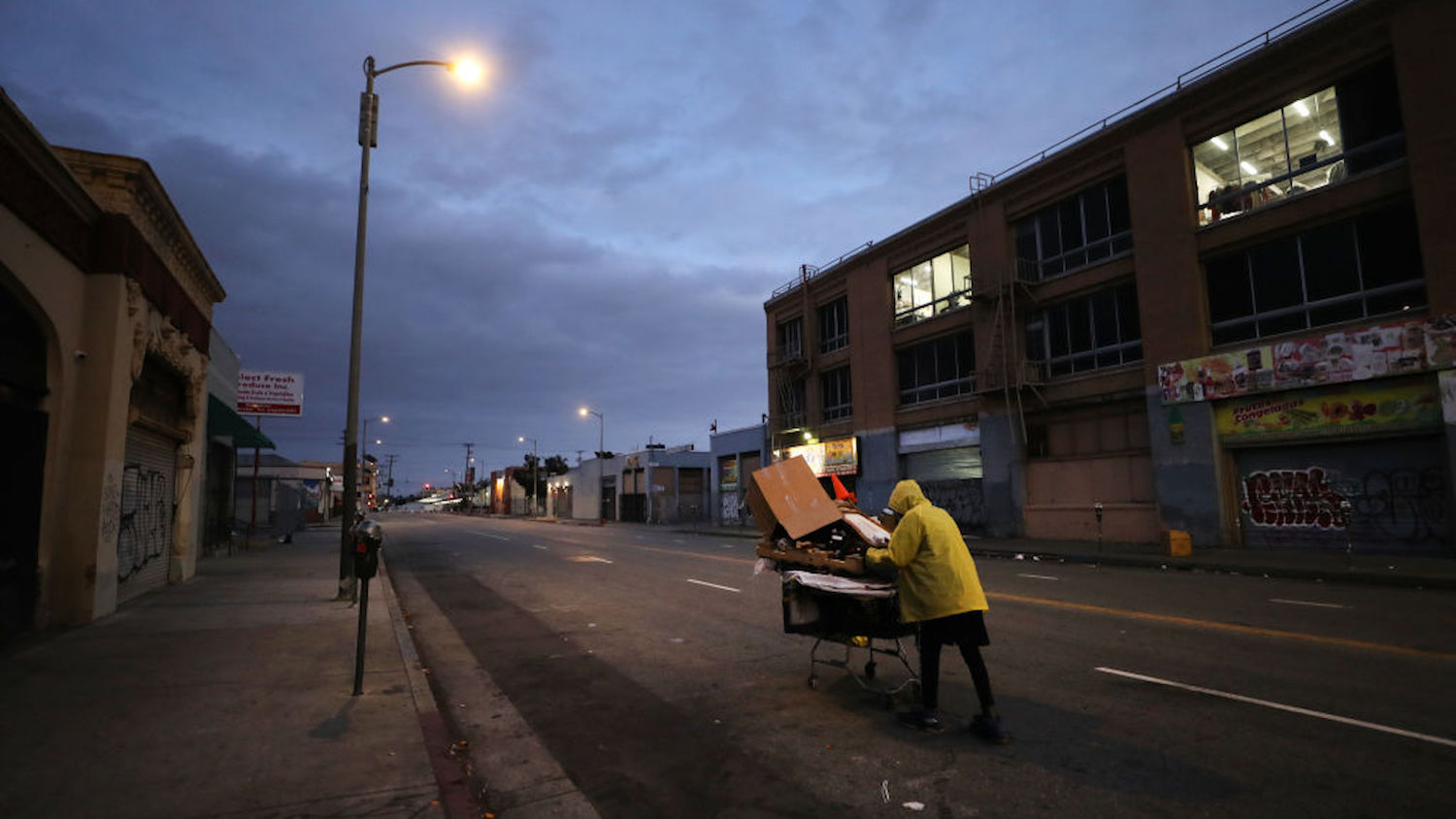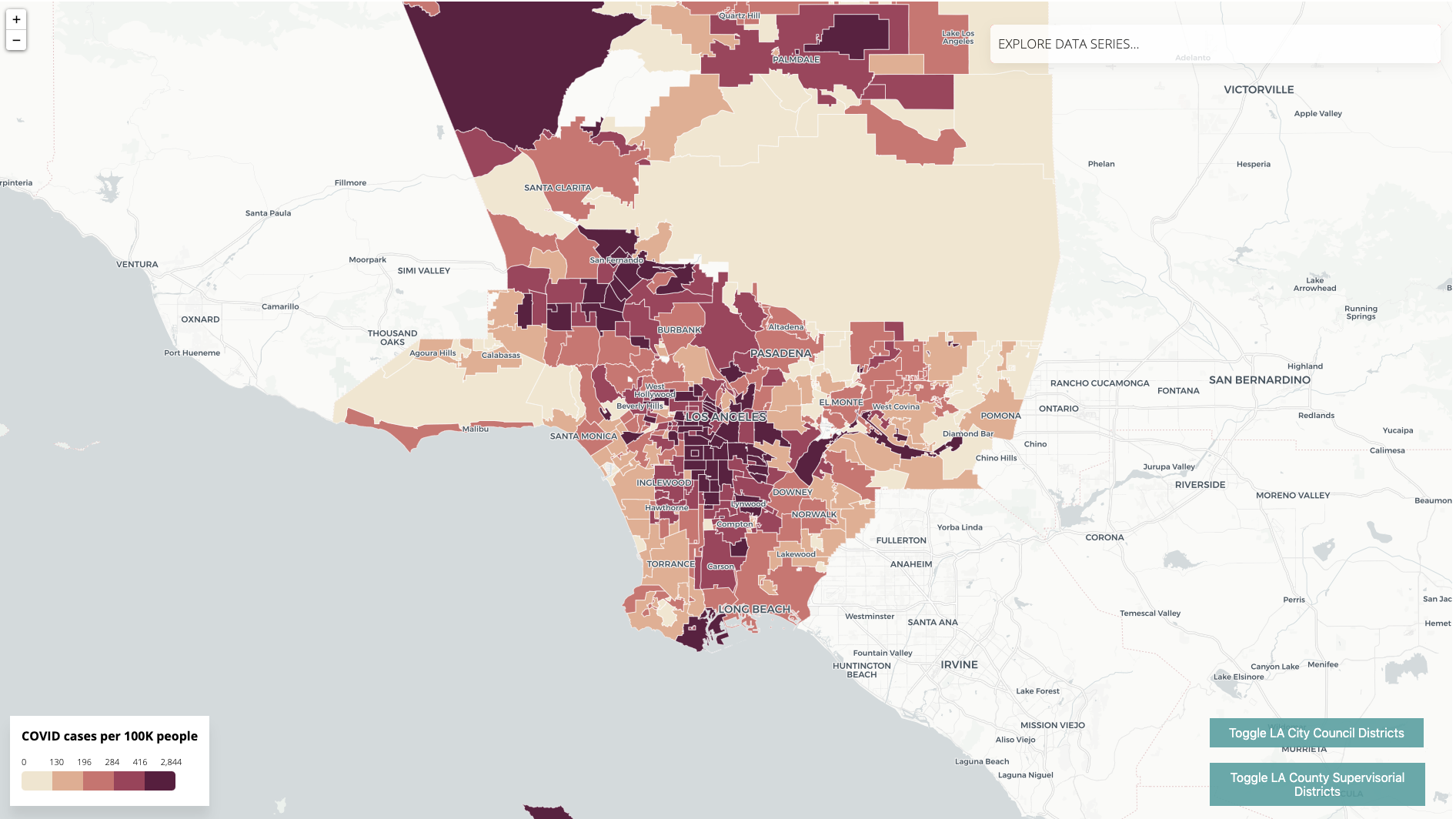Grant Funds Research Into Heat-Resilient Streetscapes
When it comes to beating the Southern California heat, small-scale interventions can have a big impact. If you’ve ever waited for the bus on a hot summer day, you’ve felt how a shady tree or a covered bus shelter can help keep you cool. Despite these tangible benefits, few studies have focused on micro-scale, or street-level, interventions to reduce heat for pedestrians and transit riders. A new grant from the California Strategic Growth Council will fund a UCLA Luskin Center for Innovation analysis of these micro-scale cooling strategies to mitigate heat at bus stops and other streetscapes. V. Kelly Turner, assistant professor of urban planning and associate director of the Center for Innovation, will lead the project, which aims to empower communities, particularly disadvantaged and heat-vulnerable communities, to cost-effectively design cooling solutions for pedestrians and transit riders. This focus on active transportation can help reduce greenhouse gas emissions and local pollution while creating climate-resilient neighborhoods. Community-engaged research will center on four historically disadvantaged areas that are vulnerable to extreme heat — Pacoima, Watts/South Los Angeles, Ontario/Inland Valley and Oasis/Coachella Valley. These communities represent a range of climate zones and built environment forms in Southern California. The project, part of the Center for Innovation’s large body of climate adaptation and resiliency research, will also leverage ongoing partnerships among UCLA, Kounkuey Design Initiative and the state’s Transformative Climate Communities program. — Michelle Einstein
Report Analyzes Asian American, Latino Votes in 2020 Primaries
Asian American and Latino voters in three key states — California, Virginia and Texas — had lower engagement in the 2020 primaries compared to four years before, according to a new analysis from the Latino Policy and Politics Initiative, or UCLA LPPI. The report analyzed precinct-level data from 10 states in the Democratic primary’s early nominating contests through March 17, when former Vice President Joe Biden became the presumptive nominee, to ascertain the candidate preference of Latino and Asian American voters. The report also found:
- Bernie Sanders did well with Latino voters in states like California, Iowa and Nevada where he had significant field operations and voter outreach.
- Sanders won at higher rates in the high-density minority precincts he carried compared to Joe Biden.
- Biden won the plurality of Latino votes in high-density Latino precincts in Virginia, Florida and some counties in Texas, demonstrating the malleability of the Latino vote, as well as the potential impact of voter outreach efforts at the local level.
- In Los Angeles County and Orange County, fewer Californians in high-density Latino precincts cast ballots than in 2016. As advocacy for vote-by-mail grows amid the COVID-19 pandemic, these results highlight a need for robust education and outreach efforts surrounding election procedures.
“The time is now for campaigns to maximize the potential of America’s diverse electorate, and that starts with the Latino and Asian American vote,” said Sonja Diaz, founding director at UCLA LPPI.
UCLA Research Guides Debate on Evictions and Homelessness
UCLA research on the looming threat of eviction and homelessness in Los Angeles County is guiding debate about how to safeguard residents as the region attempts to emerge from the COVID-19 lockdown. Recent studies from the Institute on Inequality and Democracy (II&D) and the Center for Neighborhood Knowledge (CNK), both housed at UCLA Luskin, have been cited by policymakers, civic leaders and advocacy groups. An II&D report authored by Gary Blasi, UCLA professor emeritus of law, estimated that tens of thousands of households in the county could fall into homelessness due to the pandemic. Blasi called for robust tenant protections, as well as urgent planning for temporary housing for those who lose their homes. His findings have been cited on the news and editorial pages of the Los Angeles Times, as well as on NPR, CalMatters, Streetsblog and Capital & Main. In response to the pandemic, the California court system in April put a hold on eviction proceedings statewide. Despite these protections, some Los Angeles landlords have sought to remove tenants by force or coercion, creating a “web of urban inequality,” according to Paul Ong, CNK director and author of a study on rent burdens that was cited by the Los Angeles Times. As the court considered lifting California’s eviction moratorium, advocacy groups such as Disability Rights California and the pro bono law firm Public Counsel lobbied against the move by presenting research from II&D and CNK, among other sources. The court subsequently delayed its review of the moratorium.
Loukaitou-Sideris Publishes Book on Transit Crime Around the World
“Transit Crime and Sexual Violence in Cities: International Evidence and Prevention,” a new book co-edited by Urban Planning Professor Anastasia Loukaitou-Sideris, has just been published. The book presents case studies from 18 cities on six continents to demonstrate the widespread incidence of crime in transit environments, primarily targeting women and young people. “Sexual harassment and other forms of sexual violence in public spaces are everyday occurrences for women and girls around the world and a threat to the overall sustainability of the city,” wrote Loukaitou-Sideris and co-editor Vania Ceccato of the KTH Royal Institute of Technology in Stockholm, Sweden. Concerns about physical safety aboard public transit systems can deter individuals from fully participating in school, work and public life, they noted. The book identifies urban planning improvements to safeguard passengers and ensure that cities become more accessible and therefore more sustainable. Contributors to the book, published by Routledge, represent several disciplines, including environmental criminology, architecture and design, urban planning, geography, psychology, gender and LGBTQ studies, transportation and law enforcement. In the book’s foreword, Juma Assiago of UN-Habitat’s Safer Cities program wrote that the publication “contributes to our quest for safer, inclusive, resilient, equitable and sustainable cities and human settlements.”
8th Annual Trivia Night Is a Battle of Bits
Super Quiz Bowl — a longstanding UCLA Luskin tradition — went virtual this year due to COVID-19, but enthusiasm remained high with nearly 250 competitors participating via home computers and cellphones in a trivia night held May 28. “From this mighty group, we had 19 faculty and staff, 110 students and 119 alumni,” said organizer Tammy Borrero, the School’s director of events. “This was our highest participation since its inception eight years ago.” Individuals and groups were able to compete simultaneously in the six-round tournament while enjoying a quick home-cooked meal or sofa snack and favorite beverage, thanks to Borrero and a team of staff and faculty who served as game hosts, co-organizers and participants. All three of the School’s graduate programs and the undergraduate Public Affairs major formed creatively named teams including PhDs in PJs, Mighty MURPs and Categorial Exemption. This year’s group prize went to a combined team of urban planners and social welfare graduate students, which evened out department standings across all years of competition, according to organizers. Plans are already underway to bring the event back under the tent next year.
Team Competition Winners
First Place: Plucky Opposers (Social Welfare and Urban Planning) Hanako Justice (SW), Julia Kulewicz (SW), Sam Speroni (UP), Arthur Sun (SW), Meagan Wang (UP)
Second Place: All Coast All Stars (Public Policy) Robert Gamboa, Brian Harris, Eric Schroer, Samuel Stalls, Sean Tan
Third Place: La Croix Taste Test (Public Policy) Adam Barsch, Jess Bendit, Rosie Brown, Dickran Jebejian, and Zachary Steinert-Threlkeld
Individual Competition Winners
First Place: Melody Wang, Urban Planning and Social Welfare
Second Place: Michael Busse, Urban Planning
Third Place: Nathaniel Singer, Undergraduate Program
Schoolwide Calls for Racial Justice
Since the death of George Floyd in police custody in Minneapolis, voices from across the UCLA Luskin community have joined the conversation about systemic racism in the United States, shedding light on its roots and leading calls to move toward true justice. The insights have been shared near and far. Here is a sample: Social Welfare Chair Laura Abrams told Asian news channel CNA that the wave of protest sweeping the nation has been “massive and powerful … and I don’t see it dying down any time soon.” Ananya Roy, director of the Luskin Institute on Inequality and Democracy, has led faculty from across UCLA to stand in solidarity with communities of color and “continue the unfinished work of liberation.” To explain Los Angeles’ role in the current unrest, the New York Times cited the Quality of Life Index produced by the Los Angeles Initiative, which found deep bitterness over the region’s immense income inequality. Public policy lecturer Brad Rowe told local reporters he was encouraging his students to express their support for criminal justice reform. And social justice activist Alex Norman, professor emeritus of social welfare, told the Long Beach Press-Telegram: “For most African Americans, the American dream is a nightmare. … What will it take to change the narrative? What we don’t have, leadership, at the national and local level.”
CNK Makes COVID-19 Information Available Via Online Data Map
A new online map and data repository highlight research conducted during the COVID-19 pandemic by the UCLA Center for Neighborhood Knowledge. The interactive visualization shows how different communities in Los Angeles County have been impacted by the health crisis. It draws on data and research conducted by UCLA Luskin Research Professor Paul Ong, director of the Center for Neighborhood Knowledge, working in partnership with Ong & Associates, the UCLA Latino Policy and Politics Initiative, UCLA Ziman Center for Real Estate, and the UCLA Luskin Institute on Inequality and Democracy. It visualizes information from a series of recently distributed research briefs that show disadvantaged communities are facing greater risks of income insecurity, job displacement and other hardships because of the economic fallout from the novel coronavirus.







